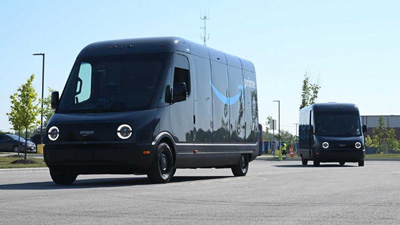Amazon continues to expand its all-electric delivery fleet, and the online retailer claims the rollout of Rivian EDV vans is the fastest of an electric delivery fleet at this scale in the U.S.
Since launching last year, Amazon claims it has more than 3,000 custom electric delivery vehicles from Rivian making deliveries in more than 500 cities and regions across the U.S. That's triple the number of Rivian EDVs reported by Amazon in November 2022.
To date, more than 75 million packages have been delivered using the zero-emission vehicles, Amazon said. That's a massive increase over the 10 million packages reported in February 2022. Rivian EDV vans will soon start delivering packages to customers' doorsteps in Cleveland, Grand Rapids, Philadelphia, Santa Rosa, San Jose, Tampa and Toledo, among other locations.
As part of The Climate Pledge co-founded by Amazon in 2019, which saw the company commit to achieving net-zero carbon by 2040, the e-commerce giant announced a partnership with Rivian to bring 100,000 electric delivery vehicles on the road by 2030 and eliminate millions of metric tons of carbon per year in the process.
Obviously, the 3,000 vehicles currently in Amazon's fleet represent a tiny fraction of the 100,000 units Rivian is bound to deliver by 2030. The EV startup had problems ramping up manufacturing of the EDV as well as its R1S and R1T vehicles, but the fact it managed to deliver 2,000 vans to Amazon in five months suggests production has increased.
Amazon started testing Rivian EDV vans in February 2021 in Los Angeles, expanding to more than a dozen cities by summer 2021. In November 2022, the e-commerce company said the rollout was going on as planned, with more than 1,000 Rivian electric vans ready for the holiday season across more than 100 U.S. cities.
In addition to the Rivian EDV, Amazon has been adding more than 15 models of battery electric vehicles to its fleet, including delivery vehicles, e-cargo bikes and e-rickshaws. The company has been testing these vehicles across the U.S., the European Union and India.
In March, The Wall Street Journal reported Amazon informed Rivian it would buy about 10,000 EDV vans this year. Since that number was purportedly at the low end of a range Amazon previously provided Rivian, the EV startup is said to have proposed removing the exclusivity clause.
This would allow Rivian to sell the EDV, which has been co-developed with Amazon in three years, to other fleet and retail customers. It remains to be seen whether the e-commerce giant will accept that.










Abby Andrews